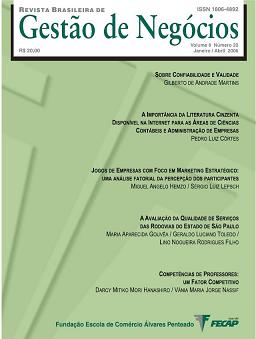Abstract
In order to assess, evaluate or quantify financial, equity, auditing and controllership oriented data related both to private and public sectors, the practioner or the researcher has to pay close attention to the significance and accurateness criteria of the research tools he is about to employ: validity and reliability. The validity criterion refers to the instrument capacity of assessing what it intends to assess; reliability deals with the constancy of results when the same individual or object is assessed, evaluated or quantified more than once. This article is aimed at explaining and discussing examples of proper criteria to indicate the reliability level: test-retest, equivalent form techniques, split-half, reliability based on evaluators, Cronbach´s alpha coefficient, as well as techniques towards validity evaluation: apparent validity, content validity, criterion validity, construct and total validity. Different illustrations of the criteria for assessing validity and reliability in the Accounting field are shown.
Key-words: Reliability. Validity. Measures. Accounting. Assessment.
If a paper is approved for publication, its copyright has to be transferred by the author(s) to the Review of Business Management – RBGN.
Accordingly, authors are REQUIRED to send RBGN a duly completed and signed Copyright Transfer Form. Please refer to the following template: [Copyright Transfer]
The conditions set out by the Copyright Transfer Form state that the Review of Business Management – RBGN owns, free of charge and permanently, the copyright of the papers it publishes. Although the authors are required to sign the Copyright Transfer Form, RBGN allows authors to hold and use their own copyright without restrictions.
The texts published by RBGN are the sole responsibility of their authors.
The review has adopted the CC-BY Creative Commons Attribution 4.0 allowing redistribution and reuse of papers on condition that the authorship is properly credited.

